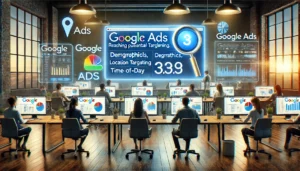PPC Management Masterclass: How UK Brands are Dominating Their Industry Show drafts

PPC Management Masterclass: In the fast-paced and ever-changing world of digital marketing, Pay-Per-Click (PPC) advertising has become a crucial tool for brands looking to stand out. In the UK, many companies are mastering PPC management to dominate their industries. This article dives deep into how UK brands are leveraging PPC to achieve remarkable success.
PPC Management Masterclass Key Takeaways
- UK brands are using PPC to gain a competitive edge in their markets.
- Investing in PPC leads to significant returns on investment and business growth.
- Successful PPC campaigns require a mix of analytical, technical, and creative skills.
- Choosing the right PPC agency can make or break your campaign’s success.
- Advanced strategies like AI, effective budgeting, and optimising ad content are key to PPC success.
The Evolution of PPC Management in the UK
PPC Management Masterclass: Historical Overview of PPC
Pay-per-click (PPC) advertising has come a long way since its inception. Initially, it was a simple model where advertisers paid a fee each time their ad was clicked. Over the years, the landscape has evolved significantly, especially in the UK. Early adopters saw the potential of PPC to drive traffic and sales, and it quickly became a staple in digital marketing strategies.
Key Milestones in UK PPC
Several key milestones have marked the evolution of PPC in the UK. The launch of Google AdWords in 2000 was a game-changer, providing businesses with a powerful tool to reach their target audience. Another significant milestone was the introduction of automated bidding strategies, which allowed advertisers to optimise their campaigns more efficiently. The rise of mobile advertising also played a crucial role, as more users began accessing the internet via their smartphones.
Current Trends in PPC Management
Today, PPC management in the UK is more sophisticated than ever. We see a strong emphasis on leveraging data to fuel growth. Advanced analytics tools help us understand user behaviour and optimise campaigns for better performance. Additionally, the integration of artificial intelligence and machine learning has revolutionised how we manage PPC campaigns. These technologies enable us to make data-driven decisions and achieve better results. The role of a London PPC agency has become increasingly important in navigating this complex landscape.
PPC management has evolved from a simple advertising model to a complex, data-driven strategy that requires expertise and continuous optimisation.
In summary, the evolution of PPC management in the UK has been marked by significant milestones and current trends that focus on data and technology. As we continue to adapt to these changes, the importance of staying updated with the latest trends cannot be overstated.
Why UK Brands are Investing Heavily in PPC
The Competitive Landscape
In the UK, the business environment is incredibly competitive. Brands are always looking for ways to stand out. PPC (Pay-Per-Click) advertising offers a direct route to reach potential customers. By using PPC, brands can appear at the top of search results, making them more visible than their competitors. This visibility is crucial in a crowded market.
ROI and Business Growth
One of the main reasons UK brands invest in PPC is the return on investment (ROI). PPC campaigns can be highly cost-effective. When managed well, they can deliver significant returns. For example, a well-optimised PPC campaign can drive traffic to a website, leading to more sales and business growth. The ability to track and measure results in real-time allows brands to adjust their strategies quickly, ensuring they get the best possible ROI.
Case Studies of Successful UK Brands
Several UK brands have seen great success with PPC. For instance, a local retailer used PPC to increase their online sales by 50% in just three months. Another example is a national chain that used PPC to boost their brand awareness and saw a 30% increase in foot traffic to their stores. These case studies highlight the potential of PPC to drive business success.
Investing in PPC is not just about spending money on ads; it’s about making smart decisions to maximise returns. By leveraging data and continuously optimising campaigns, UK brands can stay ahead of the competition and achieve their business goals.
PPC Management Masterclass: Essential Skills for a PPC Specialist
Analytical Skills
In the world of PPC, analytical skills are crucial. We need to dive deep into data to understand what works and what doesn’t. This involves looking at metrics like click-through rates, conversion rates, and cost per acquisition. Being able to interpret these numbers helps us make informed decisions that can improve campaign performance.
Technical Proficiency
A PPC specialist must be technically proficient. This means knowing how to use various PPC platforms like Google Ads and Bing Ads. We should also be comfortable with tools that help us track and analyse performance. For instance, understanding how to set up tracking codes and use analytics software is essential.
Creative Thinking
While data and technical skills are important, creative thinking is equally vital. We need to come up with compelling ad copy and engaging creatives that capture the audience’s attention. This involves brainstorming new ideas and testing different approaches to see what resonates best with our target audience.
In the ever-evolving field of PPC, a blend of analytical, technical, and creative skills is what sets a specialist apart.
By honing these skills, we can ensure that our PPC campaigns are not only effective but also innovative and engaging.
Choosing the Right PPC Agency for Your Brand
Key Factors to Consider
When selecting a PPC agency, we need to look at several key factors. First, consider the agency’s experience in your industry. An agency familiar with your market can provide better insights and strategies. Next, evaluate their track record. Have they successfully managed campaigns for brands similar to yours? Client testimonials and case studies can offer valuable insights. Lastly, consider their range of services. A comprehensive PPC ecommerce agency should offer everything from keyword research to ad creation and performance analysis.
Questions to Ask Potential Agencies
Before committing to a PPC ad agency, we should ask some critical questions. What is their approach to campaign management? How do they handle budget allocation and bid adjustments? It’s also essential to understand their reporting process. Will they provide regular updates and detailed reports? Another important question is about their use of technology. Do they leverage advanced tools and software to optimise campaigns?
Evaluating Agency Performance
Once we’ve partnered with a PPC agency, it’s crucial to continuously evaluate their performance. Set clear KPIs from the start, such as click-through rates, conversion rates, and return on ad spend. Regularly review these metrics to ensure the agency is meeting your goals. If performance dips, discuss it with the agency and adjust strategies as needed. Remember, a good PPC agency will be proactive in suggesting improvements and optimisations.
Choosing the right PPC agency can significantly impact your brand’s online success. It’s not just about finding a service provider but a partner who understands your business goals and works diligently to achieve them.
Advanced Strategies for PPC Campaigns
Utilising AI and Machine Learning (PPC Management Masterclass)
In today’s fast-paced digital world, leveraging AI and machine learning is no longer optional. These technologies help us automate and optimise our PPC campaigns. AI can predict trends and adjust bids in real-time, ensuring we get the best return on investment. Machine learning algorithms analyse vast amounts of data to identify patterns and opportunities that humans might miss. This is especially crucial as Google is set to revamp ad tracking on Android devices, impacting how we target users.
Effective Budget Management
Managing your budget effectively is key to a successful PPC campaign. We need to allocate funds wisely across different channels and campaigns. One approach is to use a tiered budget system, where we prioritise high-performing campaigns. Regularly reviewing and adjusting our budget based on performance metrics ensures we are not overspending. Here are some tips for effective budget management:
- Set clear goals and KPIs
- Monitor spending daily
- Use automated rules to control costs
- Reallocate budget based on performance
Optimising Ad Copy and Creatives
The ad copy and creatives are the face of our PPC campaigns. They need to be compelling and relevant to attract clicks. A/B testing different versions of ad copy can help us determine what resonates best with our audience. Additionally, using high-quality images and videos can significantly boost engagement. Remember, the goal is to create ads that not only attract clicks but also convert. For ecommerce PPC, this means highlighting product benefits and unique selling points.
By continuously refining our strategies and staying updated with industry trends, we can ensure our PPC campaigns remain effective and competitive.
The Role of Google Ads in PPC Management
Understanding Google Ads
Google Ads is a powerful tool in the world of PPC management. It allows us to create targeted advertisements that appear in Google search results and across the Google Display Network. This platform is essential for reaching potential customers at the right moment. Google AdWords PPC campaigns can be tailored to specific demographics, locations, and even times of day, making it a versatile option for any business.
Maximising Google Ads Features (PPC Management Masterclass)
To get the most out of Google Ads, we need to utilise its various features effectively. This includes using ad extensions, which provide additional information and links within an ad, and taking advantage of automated bidding strategies to optimise our budget. Another key feature is the ability to create responsive search ads, which adapt to show the best-performing ad combinations. By leveraging these tools, we can enhance our Google ads PPC campaigns and achieve better results.
Common Pitfalls to Avoid
PPC Management Masterclass: While Google Ads offers many benefits, there are also common pitfalls to be aware of. One major issue is not setting a proper budget, which can lead to overspending or underspending. Another common mistake is neglecting to monitor and adjust campaigns regularly. It’s crucial to keep an eye on performance metrics and make necessary adjustments to ensure the best outcomes. Additionally, failing to use negative keywords can result in irrelevant clicks, wasting valuable resources.
Effective PPC management requires a balance of strategic planning, continuous monitoring, and adaptability to changes in the market.
By understanding and utilising Google Ads effectively, we can significantly improve our PPC campaigns and drive better business results.
Leveraging Amazon Ads for eCommerce Success
Types of Amazon PPC Ads
Amazon offers several types of PPC ads to help sellers reach their target audience. The most common types are:
- Sponsored Products Ads: These appear in search results and product listing pages, closely resembling organic listings.
- Sponsored Brands Ads: These ads feature your brand logo, a custom headline, and multiple products.
- Sponsored Display Ads: These ads appear both on and off Amazon, targeting shoppers based on their interests.
Creating Effective Amazon PPC Campaigns
To create a successful Amazon PPC campaign, follow these steps:
- Log in to Amazon Seller Central and navigate to the Campaign Manager.
- Click on the ‘Create Campaign’ button and select the type of ad you want to create.
- Set your campaign name, start and end dates, and daily budget.
- Choose your targeting strategy—automatic or manual.
- Adjust your starting bids for keywords to capture early sales.
- Double-check all information and click ‘Launch Campaign’.
Remember, it usually takes 30 minutes to an hour for your ad to go live on Amazon.
Measuring Amazon PPC Performance (PPC Management Masterclass)
Tracking the performance of your Amazon PPC campaigns is crucial for ongoing success. Key metrics to monitor include:
- Click-Through Rate (CTR)
- Conversion Rate
- Return on Ad Spend (RoAS)
- Advertising Cost of Sales (ACoS)
Using these metrics, we can identify which ads are driving conversions and adjust our strategies accordingly. This data-driven approach ensures that our campaigns are always optimised for the best possible results.
The Importance of Data in PPC Management
Tracking Key Metrics (PPC Management Masterclass)
In PPC management, tracking key metrics is crucial. We need to monitor metrics like impressions, clicks, and conversions. Impressions show how often our ads are displayed, while clicks indicate user interest. Conversions, on the other hand, measure the success of our campaigns. By keeping an eye on these metrics, we can adjust our strategies to improve performance.
Data-Driven Decision Making
Data-driven decision making is at the heart of effective PPC management. We rely on data to understand what works and what doesn’t. This approach helps us allocate budgets more efficiently and target the right audience. With data, we can make informed decisions that lead to better results.
Tools for Data Analysis
There are various tools available for data analysis in PPC management. Google Analytics, for instance, provides insights into user behaviour and campaign performance. Other tools like SEMrush and Ahrefs offer competitive analysis and keyword research. Using these tools, we can gain a deeper understanding of our campaigns and make necessary adjustments.
Data is the backbone of successful PPC management. Without it, we would be navigating in the dark.
By leveraging data, we can optimise our campaigns and achieve our marketing goals. It’s essential to stay updated with the latest tools and techniques to stay ahead in the competitive landscape.
PPC Management Masterclass: Future Trends in PPC Management
The Rise of Voice Search
Voice search is becoming more popular, and it’s changing how we approach PPC management. With more people using devices like Alexa and Google Home, we need to optimise our ads for voice queries. This means focusing on natural language and long-tail keywords. Voice search is not just a trend; it’s a shift in how users interact with technology.
Impact of Privacy Regulations
Privacy regulations are tightening, and this impacts how we collect and use data for PPC campaigns. We must stay compliant with laws like GDPR and CCPA. This means being transparent about data collection and giving users control over their information. It’s crucial to adapt our strategies to maintain trust and effectiveness.
Integration of Augmented Reality in Ads
Augmented Reality (AR) is making its way into PPC advertising. AR ads offer interactive experiences that engage users in new ways. For example, users can try on clothes or see how furniture looks in their home before making a purchase. This technology can significantly boost engagement and conversion rates.
As we look to the future, it’s clear that staying ahead of these trends will be key to successful PPC management. Embracing new technologies and adapting to regulatory changes will help us maintain a competitive edge.
Common Challenges in PPC Management and How to Overcome Them
Dealing with Click Fraud
Click fraud is a significant issue in PPC management. It happens when competitors or bots click on your ads with no intention of converting. This can drain your budget quickly. To combat this, we can use click fraud detection tools and regularly monitor our campaigns for unusual activity. Implementing IP exclusions can also help reduce fraudulent clicks.
Managing Budget Constraints
Budget constraints are a common challenge, especially for small businesses. It’s crucial to allocate your budget wisely. Start by identifying your most profitable keywords and focus your spending there. We should also regularly review and adjust our bids to ensure we’re getting the best return on investment. Using automated bidding strategies can help optimise our budget.
Keeping Up with Algorithm Changes
Search engine algorithms are constantly evolving, which can impact our PPC campaigns. Staying updated with these changes is essential. We should follow industry blogs, attend webinars, and participate in forums to stay informed. Regularly reviewing and adjusting our campaigns based on the latest trends will help us stay ahead of the competition.
PPC management requires continuous learning and adaptation. By staying proactive and informed, we can overcome these challenges and achieve our advertising goals.
PPC Management Masterclass: Highlight
In the competitive landscape of PPC, dealing with click fraud is a significant issue. It happens when competitors or bots click on your ads with no intention of converting. This can drain your budget quickly. To combat this, we can use click fraud detection tools and regularly monitor our campaigns for unusual activity. Implementing IP exclusions can also help reduce fraudulent clicks.
The Benefits of a Comprehensive PPC Audit
Identifying Weaknesses in Campaigns
A comprehensive PPC audit helps us spot the weak points in our campaigns. By examining every aspect, from keywords to ad copy, we can find out what’s not working. This allows us to make necessary adjustments and improve overall performance. Identifying these weaknesses early can save us a lot of money and effort in the long run.
Improving ROI
When we conduct a PPC audit, we can see which parts of our campaigns are delivering the best return on investment (ROI). This helps us allocate our budget more effectively. By focusing on high-performing areas, we can boost our ROI and get more value for our money. A well-executed audit can turn a mediocre campaign into a highly successful one.
PPC Management Masterclass: Steps to Conduct a PPC Audit
- Review Account Structure: Start by looking at the overall structure of your PPC account. Make sure it’s organised and easy to manage.
- Analyse Keywords: Check which keywords are performing well and which ones are not. Remove or adjust the underperforming ones.
- Evaluate Ad Copy: Look at the effectiveness of your ad copy. Make sure it is engaging and relevant to your target audience.
- Inspect Landing Pages: Ensure that your landing pages are optimised for conversions. They should be relevant to the ad and provide a good user experience.
- Monitor Performance Metrics: Keep an eye on key metrics like click-through rate (CTR), conversion rate, and cost per click (CPC). These will give you a clear picture of your campaign’s performance.
Regular PPC audits are essential for maintaining the health and effectiveness of our campaigns. They help us stay ahead of the competition and ensure that we are getting the best possible results from our efforts.
By following these steps, we can make sure our PPC campaigns are always performing at their best. Whether it’s a Google ads audit or a broader PPC audit, the benefits are clear. Let’s make auditing a regular part of our PPC management strategy.
A thorough PPC audit can do wonders for your online advertising. It helps you spot areas to improve, cut down on wasted spend, and boost your ad performance. Want to see how your ads are doing? Get a free, human review of your ads’ performance today. Visit our website to get started!
Conclusion on PPC Management Masterclass
In conclusion, mastering PPC management is crucial for UK brands aiming to lead their industries. By understanding and utilising the right strategies, tools, and techniques, businesses can significantly enhance their online presence and drive more sales. The journey might seem challenging, but with consistent effort and the right guidance, success is within reach. Remember, the key is to stay updated with the latest trends and continuously optimise your campaigns. With dedication and the right approach, your brand can dominate the digital landscape.
Frequently Asked Questions for PPC Management Masterclass
What is PPC?
PPC stands for Pay-Per-Click. It’s a type of online advertising where you pay a fee each time someone clicks on your ad.
Why is PPC important for businesses?
PPC helps businesses get their ads in front of potential customers quickly. It can drive traffic to your website and increase sales.
How do UK brands benefit from PPC?
UK brands use PPC to stay competitive, reach more customers, and grow their business. It helps them stand out in their industry.
What skills are needed for a PPC specialist?
A PPC specialist needs to be good at analysing data, understanding technology, and being creative with ad copy and design.
How can I choose the right PPC agency for my brand?
Look for an agency with experience in your industry, check their past performance, and ask the right questions to ensure they meet your needs.
What are some advanced PPC strategies?
Advanced strategies include using AI for better targeting, managing your budget effectively, and optimising your ad copy and visuals.
How does Google Ads fit into PPC management?
Google Ads is a key tool in PPC management. It offers features to help you target your audience and track your ad performance.
What are the future trends in PPC?
Future trends include the rise of voice search, changes in privacy rules, and the use of augmented reality in ads.
Author
Search Blog
Free PPC Audit
Subscribe to our Newsletter
The Voices of Our Success: Your Words, Our Pride
Don't just take our word for it. With over 100+ five-star reviews, we let our work-and our satisfied clients-speak for us.
"We have been working with PPC Geeks for around 6 months and have found Mark and the team to be very impressive. Having worked with a few companies in this and similar sectors, I rate PPC Geeks as the strongest I have come across. They have taken time to understand our business, our market and competitors and supported us to devise a strategy to generate business. I value the expertise Mark and his team provide and trust them to make the best recommendations for the long-term."
~ Just Go, Alasdair Anderson





